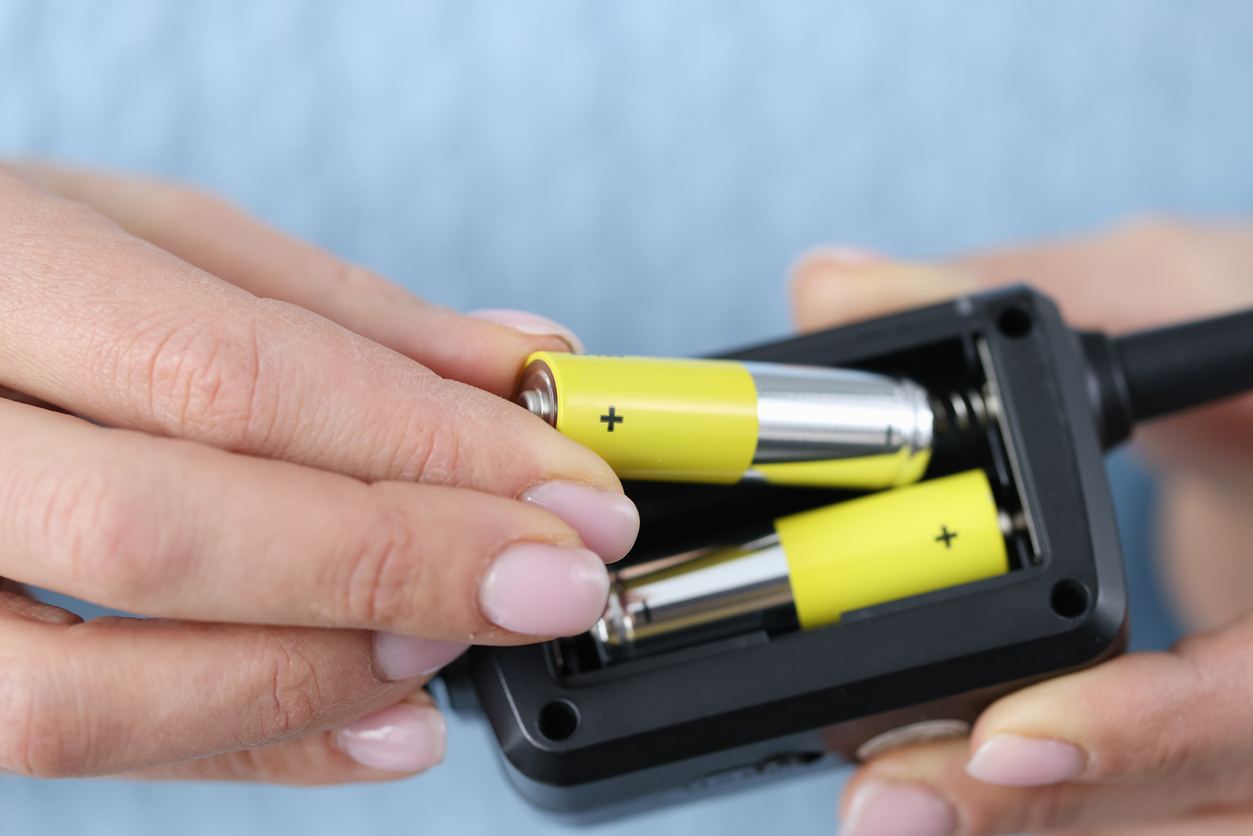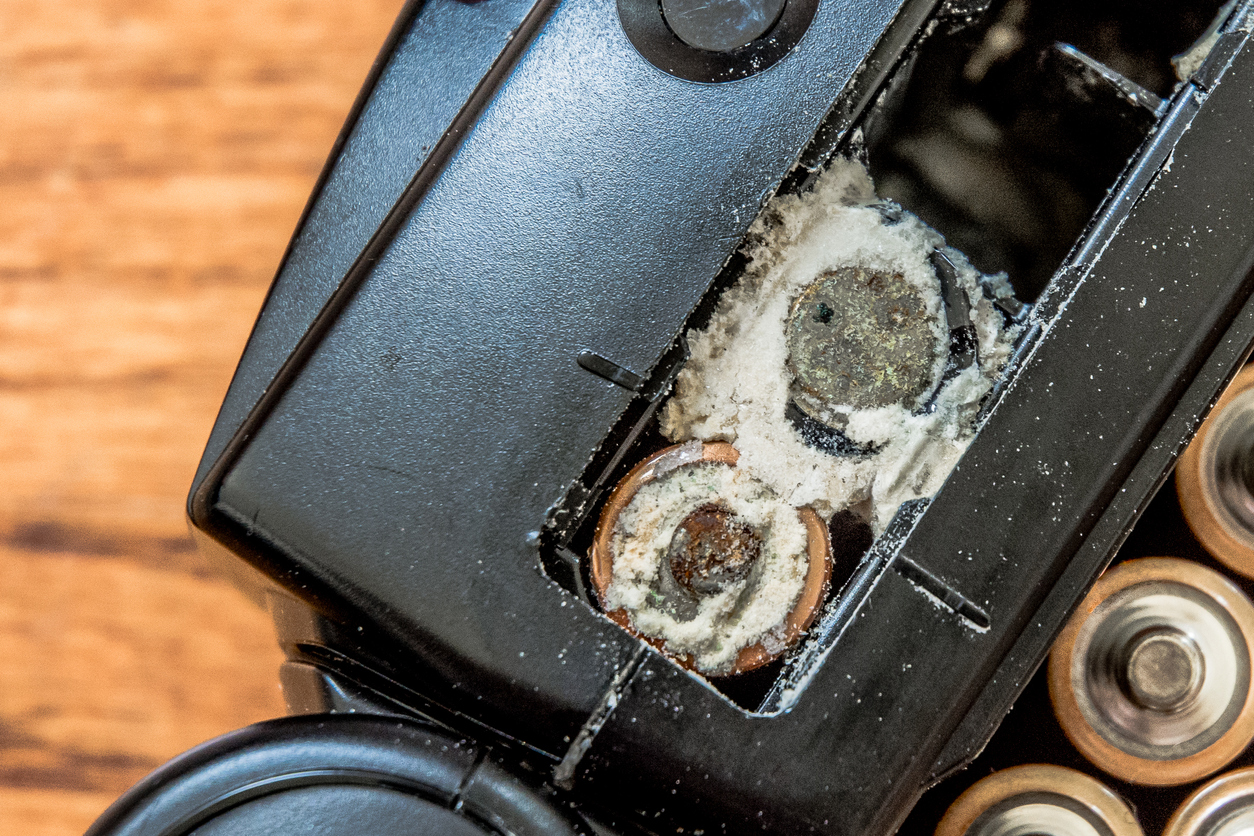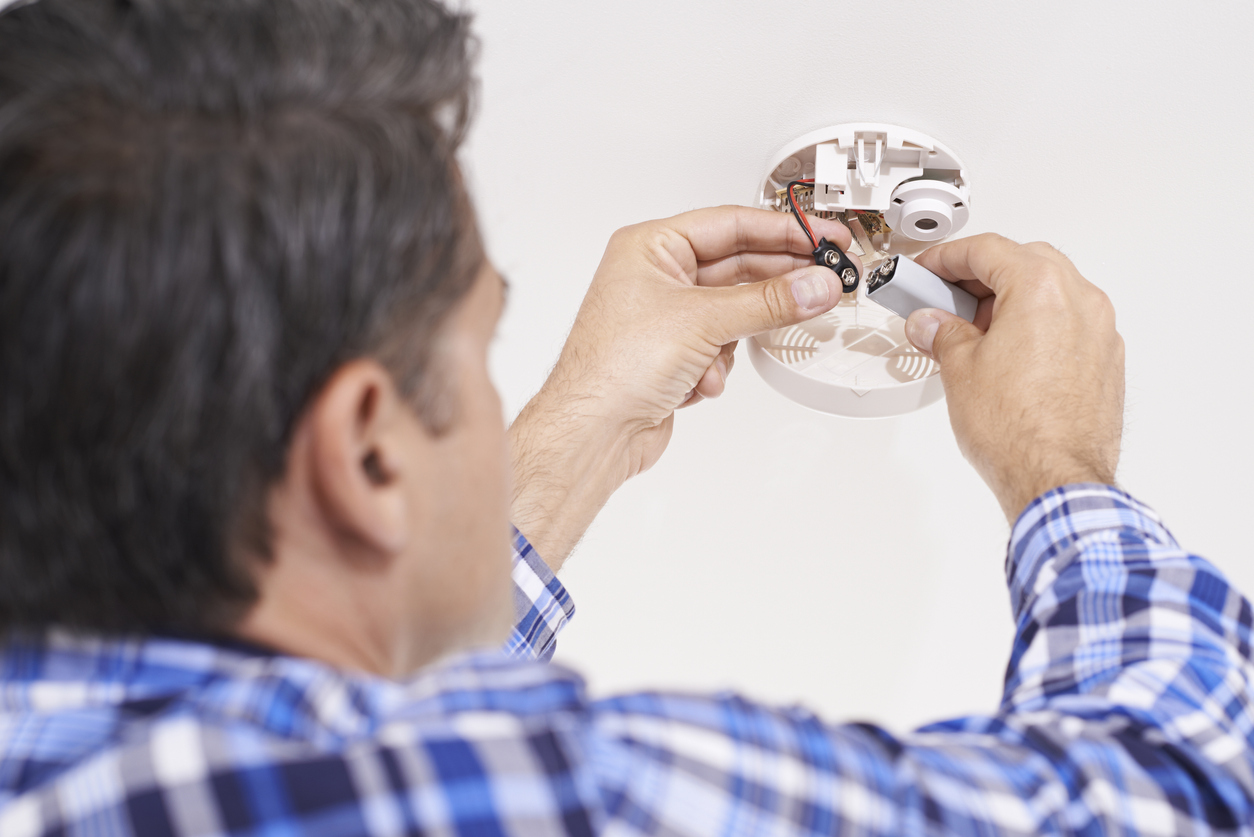We may earn revenue from the products available on this page and participate in affiliate programs. Learn More ›
Batteries—particularly the alkaline kind—can leak over time, and when they leak inside an electronic device, they can damage the battery contacts and circuitry. The good news is that most batteries that are packaged, stored, and used properly don’t leak. According to Osarumen Igbinijesu, senior quality assurance engineer at national retailer Batteries Plus, “For leakage to occur, it is typically the result of either damage or defect.” And when a battery does leak, you can usually clean battery corrosion yourself and get your device working again.
What is battery corrosion?
When your remote or a flashlight suddenly stops working and you open it up to see what’s wrong, you may notice a flaky, white substance encrusting the battery terminals and the contacts in the battery compartment. This corrosion is caused by a leaky battery.
Through damage to the battery, manufacturing defects, or excessive heat, or even when a battery sits unused for long periods of time, pressure from gas produced inside the battery can build up and break through insulating seals. This allows the battery’s electrolyte, an aqueous solution of potassium hydroxide, to seep through the seals. When potassium hydroxide reacts with the carbon dioxide in the air, it forms potassium carbonate, which is that familiar white crystalline substance.
Is battery corrosion dangerous?
Potassium hydroxide is a caustic chemical that can irritate eyes and skin, so when you’re cleaning up battery corrosion, protect work surfaces and wear gloves. Glasses are a good idea, too, just in case you accidentally flick anything toward your eyes. There’s no need to go crazy: Basic precautions are sufficient. That said, avoid ingesting any of the leaked chemicals, and remember that a swallowed battery of any type always requires an immediate trip to the ER.
Types of Batteries
Household batteries fall into two categories: primary (or single-use) batteries and rechargeable batteries. There are several types of batteries within each category. Of the many kinds of batteries, alkaline are the most likely to corrode.
Primary Batteries
- Alkaline: One of the most common and widely available household batteries; moderately priced; prone to leaking.
- Lithium: Long life and long shelf life; more expensive than alkaline; not prone to leaking.
- Zinc carbon: Inexpensive; generally used for low-power devices like clocks and remotes; tend to leak.
- Silver oxide: Expensive; button cell; used for watches, calculators, hearing aids, and other small devices; not prone to leaking.
- Zinc air: Button cell; primarily used in hearing aids; can leak if exposed to high temperatures or humidity.
Rechargeable Batteries
- Lithium ion: Popular; used in laptops, smartphones, tablets, and other devices; not prone to leaking.
- Nickel cadmium (NiCd): Used in toys, digital cameras, and flashlights; may leak if overheated, overcharged, or damaged.
- Nickel metal hydride (NiMH): Wide application, including cellphones and laptops; long lived; not prone to leakage unless overcharged or damaged.
How to Clean Battery Corrosion

Tools & Materials
Bobvila.com may earn a commission from purchases made through these links.
- Rubbing alcohol
- Microfiber cloth
- Pencil eraser (optional)
- Fine-grit sandpaper or emery board (optional)
- Compressed gas (optional)
Project Overview
Working Time: 15 minutes
Total Time: 45 minutes, including drying time
Skill Level: Beginner
Estimated Cost: $5, depending on supplies on hand
Step 1: Protect yourself and your workspace.
Spread newspaper over your work surface, and put on protective gear: specifically, gloves and safety glasses.
Step 2: Remove and dispose of corroded batteries.
Carefully take the corroded batteries out of the battery compartment and dispose of them. Rough guidelines for disposal follow, but regulations vary by municipality, so check with your local sanitation department to find out how to dispose of batteries properly. The EPA also provides information about safe battery disposal, and check out Call2Recycle and Earth911 for drop-off sites and shipping options around the country.
How to Dispose of Single-Use Batteries
- Alkaline and zinc-carbon batteries can usually be thrown in the regular trash, but check with your local sanitation department to see if recycling programs are available. Note that in California, all batteries are considered hazardous waste and must be taken to a hazardous waste collection event or a permanent collection center.
- Button cell and lithium single-use batteries typically cannot be put in the trash. Check for local recycling options.
How to Dispose of Rechargeable Batteries
- Rechargeable batteries of all types, including lithium ion, nickel cadmium, and nickel metal hydride, must be taken to a recycling center or hazardous waste collection site. Check with your local waste management provider.
- If storing spent or corroded batteries in between trips to the local hazardous waste collection center, Igbinijesu recommends taping battery terminals or putting each battery in an individual plastic bag to avoid the risk of sparks.
Step 3: Clean corrosion on the battery compartment and contacts.
Although potassium hydroxide, the substance that leaks from alkaline batteries, is often casually referred to as “battery acid,” it’s actually a base on the pH scale, which means it’s best neutralized with an acid, such as vinegar or lemon juice.
Using a cotton swab, dab a little vinegar or lemon juice on the corroded area, wait a minute or two, and then wipe away the crystalline corrosion from the battery contacts and other places in the battery compartment where it may have spread. For stubborn spots, try scrubbing with a toothbrush. Scrape off any lingering residue with a toothpick. For especially heavy corrosion, try fine sandpaper, an emery board, or a small flathead screwdriver, but be gentle.
Step 4: Wash surfaces with rubbing alcohol, and then dry.
Dip a fresh swab into some rubbing alcohol and clean off any residue on the contacts or in the battery compartment. A pencil eraser can be helpful for polishing up surfaces. Dry with a microfiber cloth and blow away any fibers. Use compressed gas for hard-to-dislodge debris. Let everything dry completely before installing fresh batteries and powering up.

What to Do if a Leaking Battery Damages Your Device
If left in too long, a corroded battery may damage a device. While cleaning out the corrosion can usually get your electronics working again, sometimes it’s not enough. In these instances, check your device’s warranty. Although it’s unlikely, damage caused by a leaking battery may be covered. Another possibility: Duracell guarantees against defects in materials and workmanship, and Energizer offers no-leak guarantees for certain batteries. Making a claim can be time-consuming, but it could be worth the effort for a camera or another big-ticket item.
How to Prevent Battery Corrosion

The best way to avoid having to clean battery corrosion out of your devices is to make sure your batteries don’t leak in the first place. There are a number of simple things you can do to prevent batteries from leaking:
- Don’t use expired batteries.
- Don’t mix old and new batteries or batteries of different brands, which Igbinijesu says can lead to performance problems or quicker decline. So, when replacing one battery in a compartment, go ahead and replace them all, using batteries of the same brand.
- Always store batteries at or below room temperature.
- Never store batteries in the refrigerator or freezer. Despite internet claims to the contrary, Igbinijesu notes, “Storing alkaline batteries in the freezer does not promote lifespan.”
- Don’t leave batteries loose in a purse, pocket, or desk drawer where the battery terminals could make contact with other metals.
- Don’t expose batteries to extreme temperatures or moisture.
- Always remove batteries from devices that you’re not planning on using for a while, such as air conditioning remotes.
- Always insert batteries in the correct direction.
- Don’t overcharge rechargeable batteries. When they’re fully charged, remove the batteries from the charger.


